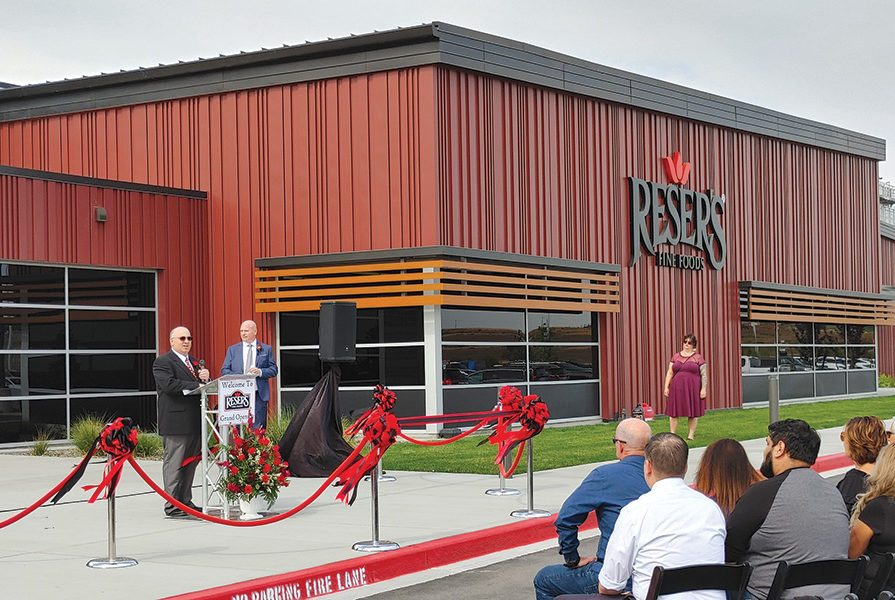
Home » Port of Pasco: Industrial parks approach capacity
Port of Pasco: Industrial parks approach capacity

October 17, 2022
The Port of Pasco has created not one but two industrial parks in recent years.
And both are running out of land to sell to food processors and other companies interested in building facilities in the Mid-Columbia region.
The Pasco Industrial Center 395, or PIC395, and Reimann Industrial Center are the newest additions to the port’s roster of industrial parks – development-ready sites where businesses can move quickly on expansion plans.
Both are nearly sold out.
PIC395, with 93 acres, is home to Reser’s Fine Foods’ new 50,000-square-foot processing plant and is the potential future home for two transportation companies. That leaves 25 acres on the market.
Reimann has 300 acres, with half already sold to Darigold Inc. The Seattle-based dairy cooperative held a ceremonial groundbreaking in September for its $600 million milk-drying plant and excavators were expected not long after. That leaves 150 acres available.
Randy Hayden, the port’s executive director, said there is significant interest in both parks and in Reser’s former facility, a 110,000-square-foot plant at the Pasco Processing Center.
“That leaves us looking for our next piece of land,” he said.
It will be some time before that happens, though. The port’s resources are committed to installing utilities and other infrastructure to support Darigold and a separate cold storage facility planned on the same site. The plant is expected to add 200 jobs to the market.
The port doesn’t have much space to lease otherwise. It has 1.8 million square feet of industrial space in its portfolio. Occupancy stands at more than 98%.
The crunch is a sign of just how popular Pasco has become with food processors and other industrial operators in recent years.
The Pasco port advances economic development by creating industrial centers for future businesses and by operating for-lease facilities, a container terminal, and the Tri-Cities Airport.
It is also promoting mixed-use development on property it owns at Osprey Pointe along the Columbia River, where it has its administrative offices.
The port is a public entity serving a population of more than 96,700 and is governed by a three-member elected commission. It has a total budget of $78.9 million, which includes an operating budget of $22.7 million and $56.2 million in capital expenditures and cash reserves. Property taxes account for $2.6 million of its total revenue.
Fees and grants represent the balance of its revenue.
The port’s service area covers most but not all of Franklin County.
PIC395
The port created PIC395 on North Capitol Avenue east of Highway 395 in 2021 to accommodate Reser’s, a longtime partner that built its original plant in 1998. Reser’s took 38 acres, leaving 55.
Old Dominion Freight Line Inc. and UPS both have signed purchase-sale agreements for 17- and 12-acre sites, respectively. Both are performing due diligence and the deals have not closed.
Reser’s began processing potatoes at its new building this summer and listed its old 110,000-square-foot plant for $15 million.
Reimann Industrial Center
The port paid $6.5 million for the 300-acre former Balcom and Moe Inc. land off Highway 395 in late 2019 for its Reimann Industrial Center. The name honors the late Ron Reimann, a port commissioner who died in a vehicle accident in 2017.
In 2021, Darigold Inc. announced it had selected Reimann for its next plant, setting off a complicated round of negotiations to raise the $21 million needed to pay for public infrastructure such as roads and utilities to accommodate the company’s needs.
The port financed bonds to pay its share. Property taxes on the new development will repay the debt.
Darigold is expected to begin operations in 2024. The company is enlisting a third party to develop a cold storage facility on its property.
Osprey Pointe
The port selected JMS Construction to convert its 55-acre riverfront Osprey Pointe property into a mixed-use neighborhood with commercial and residential development. JMS envisions a public market, 1,100 residential units, restaurants and other commercial development on the property.
James Sexton, JMS Construction’s owner, said he’s waiting for permits to begin the first phase, which will include the marketplace, residential development and a mixed-use building with both rentals and commercial space.
“We just have to get the city to say ‘yes,’ ” he said.
JMS intended to start with the public market building. Sexton said Washington’s new energy codes added about $2.5 million cost to the project. He is attempting to get it reclassified as a “mall,” which won’t require the same energy features and would preserve the open air concept of the initial plan.
He intends to complete underground utility work over the winter and to build homes and other structures in early 2023.
Tri-Cities Airport
The port owns and operates the region’s only commercial airport, which is served by United, Alaska, Delta, Avelo and Allegiant airlines on the west side of the 2,235-acre property and is host to a lively general aviation community on the east side.
Aha!, a startup that launched with service to Reno in late 2021, halted operations in August after its parent, ExpressJet, filed for bankruptcy.
The airport has been in recovery mode since 2021 after traffic fell sharply in the first year of the pandemic as travel ground to a halt.
In September, boardings were tracking toward 350,000 for 2022, which is still below the record 438,000 set in 2019.
Hayden said he’s pleased the numbers are returning to prepandemic levels and noted flight schedules have changed.
There are fewer seats available at the Tri-Cities airport. But the airplanes are fuller than normal. The load factor tops 90% on all flights, which is very unusual, he said.
In August, the U.S. Department of Transportation awarded the port a $750,000 grant to pursue a direct flight to Dallas-Fort Worth International Airport. It is no guarantee such a flight will be added to the schedule, but it is similar to the effort that led United to begin offering service to Los Angeles International Airport in March 2019.
Hayden said wooing an airline to consider adding a run could take two years.
In other airport-related news, the port is finalizing a lease agreement with Solgen Solar, Pasco’s fast-growing solar installation company.
Solgen announced it will invest $5 million to construct two buildings on leased land at the Tri-Cities Airport Business Center, an 86-acre site west of the main airport terminal.
Solgen intends to build a 100,000-square-foot operations facility on Rickenbacker Road. The second building will be a 10,000-square-foot hangar with airport access and offices for executives.
The state Community Economic Revitalization Board has committed nearly $3 million through its Committed Private Partner Program to extend a taxiway and Rickenbacker Road each by 2,000 feet, subject to Solgen Power’s lease being signed. Solgen, which previously constructed a $6 million office building in west Pasco, is expected to invest $5 million in its airport facility.
It is currently a tenant at the 370-acre Big Pasco Industrial Center.
The road and taxiway extensions will open more lots in the airport park to both aviation and nonaviation tenants.
The Airport Business Center has 21 lots for executive hangars and 47 for commercial, retail and other uses. To date, eight have been completed or are in development.
Go to portofpasco.org and flytricities.com.
Construction + Real Estate
KEYWORDS october 2022





